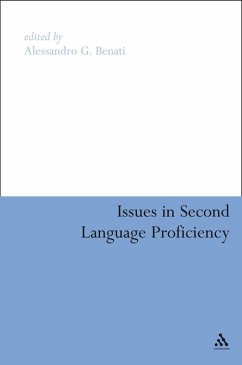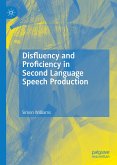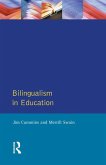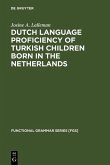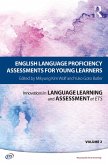Issues in Second Language Proficiency (eBook, PDF)
Redaktion: Benati, Alessandro G.
31,95 €
31,95 €
inkl. MwSt.
Sofort per Download lieferbar

16 °P sammeln
31,95 €
Als Download kaufen

31,95 €
inkl. MwSt.
Sofort per Download lieferbar

16 °P sammeln
Jetzt verschenken
Alle Infos zum eBook verschenken
31,95 €
inkl. MwSt.
Sofort per Download lieferbar
Alle Infos zum eBook verschenken

16 °P sammeln
Issues in Second Language Proficiency (eBook, PDF)
Redaktion: Benati, Alessandro G.
- Format: PDF
- Merkliste
- Auf die Merkliste
- Bewerten Bewerten
- Teilen
- Produkt teilen
- Produkterinnerung
- Produkterinnerung

Bitte loggen Sie sich zunächst in Ihr Kundenkonto ein oder registrieren Sie sich bei
bücher.de, um das eBook-Abo tolino select nutzen zu können.
Hier können Sie sich einloggen
Hier können Sie sich einloggen
Sie sind bereits eingeloggt. Klicken Sie auf 2. tolino select Abo, um fortzufahren.

Bitte loggen Sie sich zunächst in Ihr Kundenkonto ein oder registrieren Sie sich bei bücher.de, um das eBook-Abo tolino select nutzen zu können.
Benati provides clarity about the characteristics and notion of language proficiency in the field of second language acquisition. He looks at four areas of research paradigmatically related to the role of proficiency: theorizing and measuring second language proficiency; the dimensions of L2 proficiency; factors contributing to the attainment of L2 proficiency and attaining L2 proficiency in the classroom. It also contains a variety of research accounts about the specific factors which have an effect on proficiency together with a theorised measurement of proficiency in second language…mehr
- Geräte: PC
- mit Kopierschutz
- eBook Hilfe
- Größe: 3.22MB
Andere Kunden interessierten sich auch für
![Disfluency and Proficiency in Second Language Speech Production (eBook, PDF) Disfluency and Proficiency in Second Language Speech Production (eBook, PDF)]() Simon WilliamsDisfluency and Proficiency in Second Language Speech Production (eBook, PDF)80,95 €
Simon WilliamsDisfluency and Proficiency in Second Language Speech Production (eBook, PDF)80,95 €![Self-regulatory Writing Strategies and Second Language Writing Proficiency (eBook, PDF) Self-regulatory Writing Strategies and Second Language Writing Proficiency (eBook, PDF)]() Li DongSelf-regulatory Writing Strategies and Second Language Writing Proficiency (eBook, PDF)153,95 €
Li DongSelf-regulatory Writing Strategies and Second Language Writing Proficiency (eBook, PDF)153,95 €![Taboos and Controversial Issues in Foreign Language Education (eBook, PDF) Taboos and Controversial Issues in Foreign Language Education (eBook, PDF)]() Taboos and Controversial Issues in Foreign Language Education (eBook, PDF)39,95 €
Taboos and Controversial Issues in Foreign Language Education (eBook, PDF)39,95 €![Bilingualism in Education (eBook, PDF) Bilingualism in Education (eBook, PDF)]() Jim CumminsBilingualism in Education (eBook, PDF)57,95 €
Jim CumminsBilingualism in Education (eBook, PDF)57,95 €![Stories from Exceptional Language Learners Who Have Achieved Nativelike Proficiency (eBook, PDF) Stories from Exceptional Language Learners Who Have Achieved Nativelike Proficiency (eBook, PDF)]() Katarina MentzelopoulosStories from Exceptional Language Learners Who Have Achieved Nativelike Proficiency (eBook, PDF)11,95 €
Katarina MentzelopoulosStories from Exceptional Language Learners Who Have Achieved Nativelike Proficiency (eBook, PDF)11,95 €![Dutch Language Proficiency of Turkish Children Born in the Netherlands (eBook, PDF) Dutch Language Proficiency of Turkish Children Born in the Netherlands (eBook, PDF)]() Josine A. LallemanDutch Language Proficiency of Turkish Children Born in the Netherlands (eBook, PDF)77,95 €
Josine A. LallemanDutch Language Proficiency of Turkish Children Born in the Netherlands (eBook, PDF)77,95 €![English Language Proficiency Assessments for Young Learners (eBook, PDF) English Language Proficiency Assessments for Young Learners (eBook, PDF)]() English Language Proficiency Assessments for Young Learners (eBook, PDF)46,95 €
English Language Proficiency Assessments for Young Learners (eBook, PDF)46,95 €-
-
-
Benati provides clarity about the characteristics and notion of language proficiency in the field of second language acquisition. He looks at four areas of research paradigmatically related to the role of proficiency: theorizing and measuring second language proficiency; the dimensions of L2 proficiency; factors contributing to the attainment of L2 proficiency and attaining L2 proficiency in the classroom.
It also contains a variety of research accounts about the specific factors which have an effect on proficiency together with a theorised measurement of proficiency in second language research. It will be required reading for researchers in applied linguistics and second language acquisition.
Produktdetails
- Produktdetails
- Verlag: Bloomsbury eBooks UK
- Seitenzahl: 270
- Erscheinungstermin: 10. Juni 2009
- Englisch
- ISBN-13: 9781441175939
- Artikelnr.: 40781608
- Verlag: Bloomsbury eBooks UK
- Seitenzahl: 270
- Erscheinungstermin: 10. Juni 2009
- Englisch
- ISBN-13: 9781441175939
- Artikelnr.: 40781608
- Herstellerkennzeichnung Die Herstellerinformationen sind derzeit nicht verfügbar.
Alessandro G. Benati is Professor in Second Language Acquisition and Director of Research and Enterprise at the University of Greenwich, UK.
Acknowledgements
Introduction
1. Attaining second language proficiency, Alessandro Benati (University of
Greenwich, United Kingdom)
Part I: Theory and dimensions of second language proficiency
2. What is 'priming', and what might priming techniques be able to tell us
about L2 learning and proficiency? Emma Marsden (University of York, United
Kingdom)
3. Cross-linguistic influence in L2 verb frames: the effects of word
familiarity and language proficiency, Christopher J Hall (York St John
University, United Kingdom) and Areli Reyes (Universidad Autónoma de
Tlaxcala, Mexico)
4. The role of working memory in the development of L2 grammatical
proficiency, Clare Wright (Newcastle University, United Kingdom)
Part II: Factors contributing to the attainment of L2 proficiency
5. Statistical learning and innate knowledge in the development of second
language proficiency: evidence from the acquisition of gender concord,
Roger Hawkins (University of Essex, United Kingdom)
6. Metalinguistic knowledge: A stepping stone towards L2 proficiency? Karen
Roehr (University of Essex, United Kingdom) and Gabriela Adela Gánem-
Gutiérrez (University of Essex, United Kingdom)
7. The development of vocabulary proficiency in relation to learning style,
Paul Booth (Kingston University, United Kingdom)
8. Second language reading proficiency and word recognition: The concept of
saliency and its application across different scripts, Mick Randall
(British University in Dubai, Dubai)
9. L2 proficiency: measuring the intelligibility of words and extended
speech, Sara Kennedy (McGill University, Montréal, Canada)
10. English with a native-like accent: an empirical study on proficiency,
Tanja Angelovska & Angela Hahn (University of Munich, Germany) Part 3:
Attaining L2 proficiency in the classroom
11. Formal intervention and the development of proficiency: the role of
explicit Formation, Bill Van Patten (Texas Tech University, United States
of America)
12. Secondary and cumulative effects in attaining L2 proficiency in the
classroom. Alessandro Benati (University of Greenwich, United Kingdom),
James Lee (University of New South Wales, Australia) and Cecile Laval
(University of Greenwich, United Kingdom)
13. Models of speaking and the assessment of second language proficiency.
Peter Skehan (Chinese University of Hong Kong, China)
14. Researching task difficulty: towards understanding L2 proficiency.
Parvaneh Tavakoli (London Metropolitan University, United Kingdom)
15. On transfer, proficiency and cross-individual/aggregate SLA
differences: Examining Adjectival Semantics in L2 Spanish, Pedro
Guijarro-Fuentes (University of Plymouth, United Kingdom), Tiffany Judy
(University of Iowa, United States of America) and Jason Rothman
(University of Plymouth, United Kingdom)
Index
Introduction
1. Attaining second language proficiency, Alessandro Benati (University of
Greenwich, United Kingdom)
Part I: Theory and dimensions of second language proficiency
2. What is 'priming', and what might priming techniques be able to tell us
about L2 learning and proficiency? Emma Marsden (University of York, United
Kingdom)
3. Cross-linguistic influence in L2 verb frames: the effects of word
familiarity and language proficiency, Christopher J Hall (York St John
University, United Kingdom) and Areli Reyes (Universidad Autónoma de
Tlaxcala, Mexico)
4. The role of working memory in the development of L2 grammatical
proficiency, Clare Wright (Newcastle University, United Kingdom)
Part II: Factors contributing to the attainment of L2 proficiency
5. Statistical learning and innate knowledge in the development of second
language proficiency: evidence from the acquisition of gender concord,
Roger Hawkins (University of Essex, United Kingdom)
6. Metalinguistic knowledge: A stepping stone towards L2 proficiency? Karen
Roehr (University of Essex, United Kingdom) and Gabriela Adela Gánem-
Gutiérrez (University of Essex, United Kingdom)
7. The development of vocabulary proficiency in relation to learning style,
Paul Booth (Kingston University, United Kingdom)
8. Second language reading proficiency and word recognition: The concept of
saliency and its application across different scripts, Mick Randall
(British University in Dubai, Dubai)
9. L2 proficiency: measuring the intelligibility of words and extended
speech, Sara Kennedy (McGill University, Montréal, Canada)
10. English with a native-like accent: an empirical study on proficiency,
Tanja Angelovska & Angela Hahn (University of Munich, Germany) Part 3:
Attaining L2 proficiency in the classroom
11. Formal intervention and the development of proficiency: the role of
explicit Formation, Bill Van Patten (Texas Tech University, United States
of America)
12. Secondary and cumulative effects in attaining L2 proficiency in the
classroom. Alessandro Benati (University of Greenwich, United Kingdom),
James Lee (University of New South Wales, Australia) and Cecile Laval
(University of Greenwich, United Kingdom)
13. Models of speaking and the assessment of second language proficiency.
Peter Skehan (Chinese University of Hong Kong, China)
14. Researching task difficulty: towards understanding L2 proficiency.
Parvaneh Tavakoli (London Metropolitan University, United Kingdom)
15. On transfer, proficiency and cross-individual/aggregate SLA
differences: Examining Adjectival Semantics in L2 Spanish, Pedro
Guijarro-Fuentes (University of Plymouth, United Kingdom), Tiffany Judy
(University of Iowa, United States of America) and Jason Rothman
(University of Plymouth, United Kingdom)
Index
Acknowledgements
Introduction
1. Attaining second language proficiency, Alessandro Benati (University of
Greenwich, United Kingdom)
Part I: Theory and dimensions of second language proficiency
2. What is 'priming', and what might priming techniques be able to tell us
about L2 learning and proficiency? Emma Marsden (University of York, United
Kingdom)
3. Cross-linguistic influence in L2 verb frames: the effects of word
familiarity and language proficiency, Christopher J Hall (York St John
University, United Kingdom) and Areli Reyes (Universidad Autónoma de
Tlaxcala, Mexico)
4. The role of working memory in the development of L2 grammatical
proficiency, Clare Wright (Newcastle University, United Kingdom)
Part II: Factors contributing to the attainment of L2 proficiency
5. Statistical learning and innate knowledge in the development of second
language proficiency: evidence from the acquisition of gender concord,
Roger Hawkins (University of Essex, United Kingdom)
6. Metalinguistic knowledge: A stepping stone towards L2 proficiency? Karen
Roehr (University of Essex, United Kingdom) and Gabriela Adela Gánem-
Gutiérrez (University of Essex, United Kingdom)
7. The development of vocabulary proficiency in relation to learning style,
Paul Booth (Kingston University, United Kingdom)
8. Second language reading proficiency and word recognition: The concept of
saliency and its application across different scripts, Mick Randall
(British University in Dubai, Dubai)
9. L2 proficiency: measuring the intelligibility of words and extended
speech, Sara Kennedy (McGill University, Montréal, Canada)
10. English with a native-like accent: an empirical study on proficiency,
Tanja Angelovska & Angela Hahn (University of Munich, Germany) Part 3:
Attaining L2 proficiency in the classroom
11. Formal intervention and the development of proficiency: the role of
explicit Formation, Bill Van Patten (Texas Tech University, United States
of America)
12. Secondary and cumulative effects in attaining L2 proficiency in the
classroom. Alessandro Benati (University of Greenwich, United Kingdom),
James Lee (University of New South Wales, Australia) and Cecile Laval
(University of Greenwich, United Kingdom)
13. Models of speaking and the assessment of second language proficiency.
Peter Skehan (Chinese University of Hong Kong, China)
14. Researching task difficulty: towards understanding L2 proficiency.
Parvaneh Tavakoli (London Metropolitan University, United Kingdom)
15. On transfer, proficiency and cross-individual/aggregate SLA
differences: Examining Adjectival Semantics in L2 Spanish, Pedro
Guijarro-Fuentes (University of Plymouth, United Kingdom), Tiffany Judy
(University of Iowa, United States of America) and Jason Rothman
(University of Plymouth, United Kingdom)
Index
Introduction
1. Attaining second language proficiency, Alessandro Benati (University of
Greenwich, United Kingdom)
Part I: Theory and dimensions of second language proficiency
2. What is 'priming', and what might priming techniques be able to tell us
about L2 learning and proficiency? Emma Marsden (University of York, United
Kingdom)
3. Cross-linguistic influence in L2 verb frames: the effects of word
familiarity and language proficiency, Christopher J Hall (York St John
University, United Kingdom) and Areli Reyes (Universidad Autónoma de
Tlaxcala, Mexico)
4. The role of working memory in the development of L2 grammatical
proficiency, Clare Wright (Newcastle University, United Kingdom)
Part II: Factors contributing to the attainment of L2 proficiency
5. Statistical learning and innate knowledge in the development of second
language proficiency: evidence from the acquisition of gender concord,
Roger Hawkins (University of Essex, United Kingdom)
6. Metalinguistic knowledge: A stepping stone towards L2 proficiency? Karen
Roehr (University of Essex, United Kingdom) and Gabriela Adela Gánem-
Gutiérrez (University of Essex, United Kingdom)
7. The development of vocabulary proficiency in relation to learning style,
Paul Booth (Kingston University, United Kingdom)
8. Second language reading proficiency and word recognition: The concept of
saliency and its application across different scripts, Mick Randall
(British University in Dubai, Dubai)
9. L2 proficiency: measuring the intelligibility of words and extended
speech, Sara Kennedy (McGill University, Montréal, Canada)
10. English with a native-like accent: an empirical study on proficiency,
Tanja Angelovska & Angela Hahn (University of Munich, Germany) Part 3:
Attaining L2 proficiency in the classroom
11. Formal intervention and the development of proficiency: the role of
explicit Formation, Bill Van Patten (Texas Tech University, United States
of America)
12. Secondary and cumulative effects in attaining L2 proficiency in the
classroom. Alessandro Benati (University of Greenwich, United Kingdom),
James Lee (University of New South Wales, Australia) and Cecile Laval
(University of Greenwich, United Kingdom)
13. Models of speaking and the assessment of second language proficiency.
Peter Skehan (Chinese University of Hong Kong, China)
14. Researching task difficulty: towards understanding L2 proficiency.
Parvaneh Tavakoli (London Metropolitan University, United Kingdom)
15. On transfer, proficiency and cross-individual/aggregate SLA
differences: Examining Adjectival Semantics in L2 Spanish, Pedro
Guijarro-Fuentes (University of Plymouth, United Kingdom), Tiffany Judy
(University of Iowa, United States of America) and Jason Rothman
(University of Plymouth, United Kingdom)
Index
